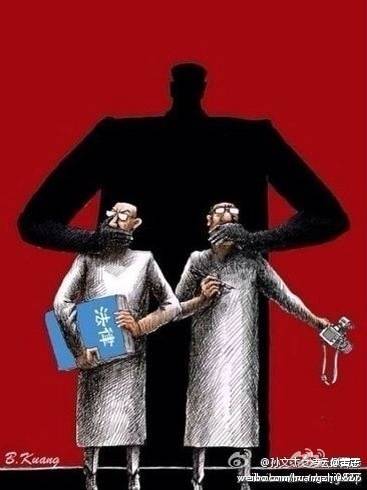The following censorship instructions, issued to the media by government authorities, have been leaked and distributed online.
State Council Information Office: All websites are asked to remove the following articles and related commentary: (1) New Express reporter Chen Yongzhou arrested, News Express front page story; (2) State Council Adviser: Learn from German Government’s Repossession of Unsold Homes After Seven Years. (October 23, 2013)
国新办:请各网站删除如下报道以及有关消息和评论 :1.新快报记者陈永洲被捕,新快报头版报道;2. 国务院参事:房子闲置七年可学德国收归政府所有。
Chen was detained last week by Changsha police operating outside their jurisdiction for “damaging the business reputation” of construction machinery manufacturer Zoomlion. In today’s edition, New Express ran a front page editorial with the headline “Please Release Him.”
Economic Daily published a story [zh] yesterday on State Council Advisor Chen Quansheng’s recommendations for deflating China’s housing bubble, delivered at Tsinghua University:
“A core strategy for solving the unmitigated rise of housing prices is an eight word principle: allow buying, limit selling, encourage renting, punish vacancy.”
“解决目前房价高涨不下的一个核心对策是16字方针:允许买房、限制卖房、奖励租房、处罚空房。” [Source]
Central Propaganda Department: Regarding coverage of the verdict of Bo Xilai’s second trial: the media may only republish Xinhua News Agency wire copy; do not gather information or speculate [on the story]; practically reinforce management of subordinates’ weibo. (October 23, 2013)
中宣部:有关薄熙来案二审宣判的报道,媒体只转发新华社通稿,不采访、不炒作,要切实加强对从属人员微博的管理。
Chinese journalists and bloggers often refer to these instructions as “Directives from the Ministry of Truth.”
CDT has collected the selections we translate here from a variety of sources and has checked them against official Chinese media reports to confirm their implementation.
Since directives are sometimes communicated orally to journalists and editors, who then leak them online, the wording published here may not be exact. The original publication date on CDT Chinese is noted after the directives; the date given may indicate when the directive was leaked, rather than when it was issued. CDT does its utmost to verify dates and wording, but also takes precautions to protect the source.









